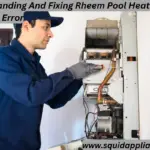Just as a ship needs sails to catch the wind for movement, your island cooktop requires a vent for optimal functionality. The kitchen is the heart of any home, and an island cooktop is its pulsating beat.
Without proper ventilation, this heartbeat can become erratic or even harmful.
In this comprehensive guide, we’ll explore whether an island cooktop really needs a vent. We’ll delve into the advantages of venting such systems, the reasons why many homeowners and professionals view it as necessary, the various types of vents available on the market today, and how to install and maintain them correctly for longevity and efficiency.
Does an Island Cooktop Need a Vent?
An island cooktop needs a vent for safety, efficiency, and optimal functionality. Venting improves air quality by removing smoke, odors, and airborne particles. Without proper ventilation, cooking odors can linger, and excessive heat may damage cooktop materials. Building codes and regulations may also require vents for island cooktops, ensuring safety and compliance.
Key Takeaways
- Island cooktops require proper ventilation for safety, efficiency, and optimal functionality.
- Venting an island cooktop improves air quality by removing smoke, odors, and airborne particles.
- Vent-less systems may seem attractive, but without proper ventilation, cooking odors can linger, and excessive heat may damage cooktop materials.
- Building codes and regulations may require vents for island cooktops, and permit acquisition is mandatory before installing a vent.
Understanding Kitchen Ventilation
You’ve got to understand that kitchen ventilation is crucial, especially when you’re using an island cooktop. It’s all about balancing ventilation efficiency with your kitchen aesthetics.
Without proper ventilation, smoke and odors can accumulate, causing discomfort and potential health issues. Plus, a well-designed vent can add to your kitchen’s overall appeal.
So yes, considering a vent for your island cooktop is not just practical but also necessary.
Benefits of Venting an Island Cooktop
As a cooking enthusiast, I can’t overstate the importance of venting an island cooktop. It’s not just about aesthetics or meeting building codes; it significantly enhances your kitchen’s air quality by effectively removing smoke, grease, and other airborne particles that arise from cooking.
Moreover, it provides superb heat and odor control, which contributes to a more comfortable and enjoyable cooking experience.
Improved Air Quality
Despite your best efforts to ignore it, the unpleasant aroma from last night’s fish fry lingers in the air like an unwelcome guest. It proves that a vent for your island cooktop isn’t just about aesthetics but also about improving indoor air quality.
- It reduces airborne allergens caused by cooking fumes.
- It lessens the health implications brought on by inhaling these harmful particles.
- It eliminates lingering odors for a fresher kitchen environment.
Heat and Odor Control
Let’s not forget that controlling heat and odors also plays a huge role in maintaining a comfortable and inviting kitchen space. Vent-less systems might seem attractive for their sleek design, but without proper ventilation, cooking odors can linger, and excessive heat may damage your cooktop materials.
It’s crucial to install an efficient vent system over your island cooktop to ensure long-lasting durability and a pleasant cooking environment.
The Necessity of a Vent
When it comes to the necessity of a vent for an island cooktop, we can’t overlook crucial factors such as building codes and regulations, as well as safety considerations.
It’s not just about enhancing your kitchen’s aesthetics or improving cooking efficiency; there are legal and safety aspects that you need to be aware of.
Navigating these regulations might seem daunting, but understanding them provides a foundation for a safer and more compliant kitchen setup.
Building Codes and Regulations
Navigating the labyrinth of building codes and regulations might seem like a Herculean task, but it’s crucial to keep your kitchen renovation on the straight and narrow. Zoning restrictions could impact you if you need a vent. Also, permit acquisition is key before starting work. Here’s a quick guide:
| Aspect | Consideration |
|---|---|
| Zoning Restrictions | May require vents for island cooktops |
| Permit Acquisition | Mandatory before installation begins |
Understanding this helps maintain legality and safety.
Safety Considerations
While keeping within the lines of building codes is vital, it’s equally important to prioritize safety during your kitchen renovation.
- Fire prevention: An island cooktop vent can provide a significant barrier against potential fires. It helps by reducing heat buildup and removing flammable grease particles.
- Carbon monoxide risk: A properly installed vent reduces this risk by expelling harmful gases outside, thereby promoting good indoor air quality.
Exploring Venting Options for Island Cooktops
You’ve got your heart set on an island cooktop, but now you’re probably wondering about the venting options, right?
Well, there are quite a few to consider. Island aesthetics play a big role in choosing between overhead hoods and downdraft systems. Both can be stylish and efficient.
Alternatively, cooktops with integrated ventilation are also an option if you want a more seamless look.
Installation and Maintenance
Ready to dive into the world of installation and maintenance for your dream kitchen feature? Let’s talk about vent cleaning techniques and cooktop installation costs.
| Step | Cooktop Installation | Maintenance |
|---|---|---|
| 1 | Purchase suitable vent | Regular dusting |
| 2 | Hire professional installer | Annual deep clean |
| 3 | Ensure compliance with codes | Replace filters |
| 4 | Test functionality post-installation | Apply vent cleaning techniques |
| 5 | # Budget for installation costs | # Plan for regular upkeep |
Remember, a well-maintained vent ensures optimal cooktop performance!
Frequently Asked Questions
What are the cost implications of installing a vent for an island cooktop?
Installing a vent for an island cooktop can be pricey. Vent installation costs and timeframe vary, but expect to pay for labor and materials. Additionally, vent maintenance costs should be factored into your budget.
Are there any aesthetic considerations to keep in mind while installing a vent for an island cooktop?
Absolutely! Vent placement options and vent design choices greatly impact aesthetics. Choose a design that complements your kitchen’s style. Position it strategically for visual balance while ensuring functionality isn’t compromised.
How does the size of my kitchen affect the need for a vent with an island cooktop?
Like a ship lost in fog, the size of your kitchen can steer your cooktop placement. A bigger space may dilute smoke, but ventilation efficiency is key to ensure it doesn’t linger. A vent always helps!
Are there any alternative solutions if I don’t want to install a vent for my island cooktop?
Yes, ventless cooktops and induction cooking are great alternatives if you don’t want a vent. Ventless cooktops filter air while induction cooktops produce less heat, reducing the need for ventilation.
How does the type of cooking I do affect the necessity of a vent for an island cooktop?
The type of cooking I do heavily influences the need for a vent. Frequent frying or grilling requires efficient vent maintenance practices and certain cooktop vent types to eliminate grease, smoke, and odors effectively.
Conclusion
In a nutshell, having a vent for your island cooktop isn’t just about following codes; it’s about safety and comfort.
Imagine juxtaposing a smoke-filled kitchen with one that’s fresh and odorless. The difference is clear—the right ventilation makes all the difference.
From different types of vents to installation and upkeep, remember: informed decisions lead to practical solutions.
So yes, your island cooktop does need a vent!






